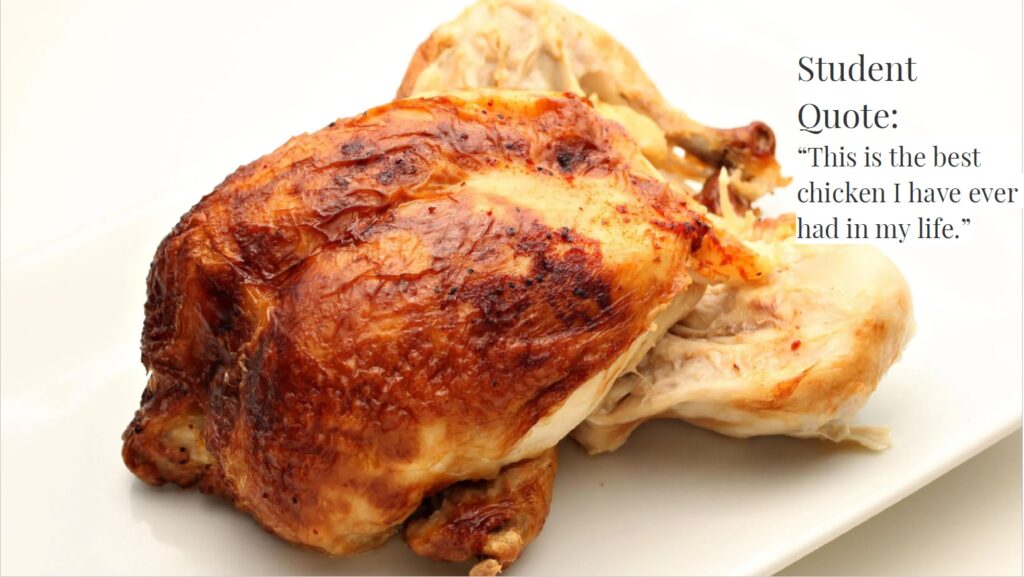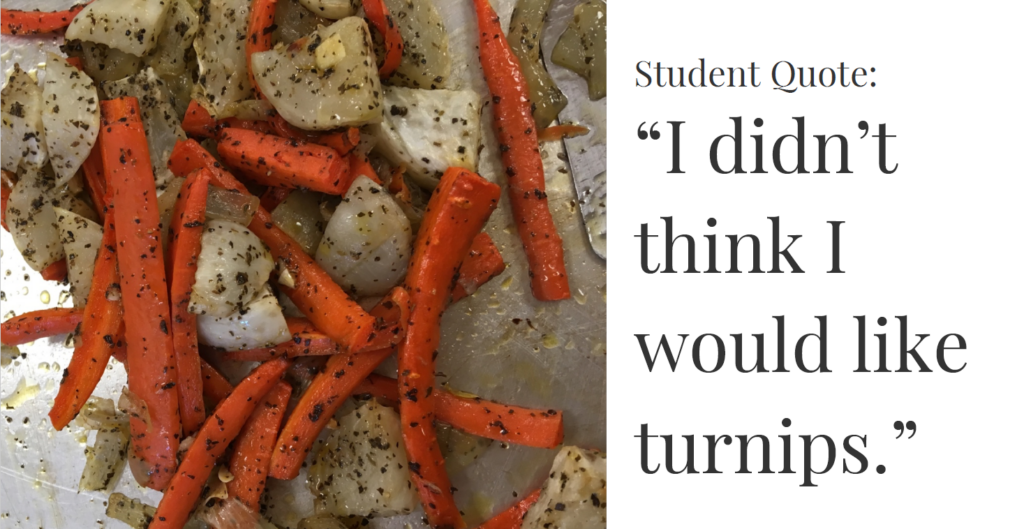Final report for YENC17-116
Project Information
The goal of this grant was for students to learn where their food comes from and the viability of sustainable farming and direct marketing. Throughout this project, students learned about different sustainable farming practices like cover cropping and organic agriculture through farm tours and even cooking with local ingredients in their culinary arts class. It is far too easy these days to not think about the person who grew the food you purchase in the grocery store. Through presentations, farm tours, and a farmers market tour, students interacted with farmers, learned about food production, and understood the value agriculture adds to rural communities.
Over the course of the project, we engaged 200 youth through 5 on-farm tours and 8 presentations. Out of the 200 students, 140 completed surveys to evaluate learning outcomes. Out of those 140 students, 139 reported changes in knowledge regarding sustainable agricultural principles. Students learned about the impacts of monoculture farming and the importance of crop diversity, how cover crops help with water conservation and soil health, how to reduce soil erosion, and what it means to be a certified organic farm. Over half of the classrooms that had a presentation were also able to understand these concepts during farm tours where students saw the true diversity of Nebraska farming and sustainable farms. Students observed aquaponic systems, certified organic production, livestock, niche production of micro-greens, and even a farm-to-table restaurant.
Overall, from spring 2018 through spring 2019, 54 high school students toured local farms and an additional 149 youth gained a deeper understanding of sustainable agriculture through presentations. An unexpected aspect of this project was the interest from high school culinary teachers. Five out of the eight classrooms that participated in this project were teaching culinary arts. As a result, 49 students were able to learn about sustainable and local agriculture in a presentation one week and the next week prepare meals using local ingredients.
- Provide Nebraskan students ages 15-22 first-hand experience with profitable, sustainable agriculture operations, value-added production and direct marketing at farmer's markets.
- Engage students with the importance of ecologically sound practices such as crop diversity, cover crops, soil and water quality improvements, soil erosion control, rotational grazing, poultry and small-scale livestock production, organic agriculture, and other practices inspired by meetings with farmers.
- Develop students' understanding of value-added products and direct marketing as components of sustainable agriculture systems, and the role of a farmer's market in a sustainable and socially responsible local food system.
- Extend impact of program to a wider audience through the creation of a sustainable agriculture website with resources for teachers and educators.
Educational & Outreach Activities
Participation Summary:
- Presentations and Farm Tours
- In 2018, 19 students from Crete High School in the advanced ProStart Culinary Program learned about sustainable agriculture and value-added agriculture through a classroom presentation and local farm tours at Grow with the Flow Aquaponic Horticulture and Robinette Farms. Students witnessed first hand season-extension practices like high tunnels and greenhouses as well as value-added enterprises like cut flowers to micro-greens. Touring the aquaponic farm was a favorite as students were amazed that you can grow plants with fish waste. Students submitted papers or visual projects to share what they learned that day. Several projects are displayed on the Buy Fresh Buy Local Nebraska new sustainable agriculture website (http://buylocalnebraska.org/student-testimonials).
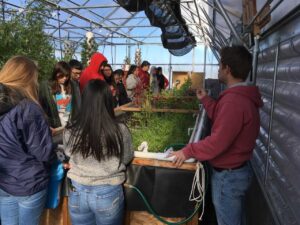
Students learn how plants can grow using nutrients from fish waste at an aquaponic farm in eastern Nebraska. 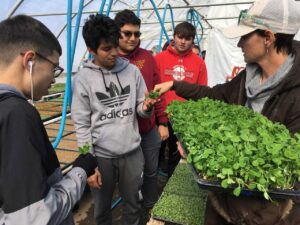
Farmer Chloe gives samples of micro-greens to culinary students from a rural high school in Nebraska. - In 2019, 35 students from a rural high school with interests in culinary and agriculture vocations learned about sustainable agriculture. Students visited two certified organic operations to learn about cover crops, soil fertility, small-scale livestock production, pastured poultry, and drip irrigation. At one farm, students also toured their on-farm restaurant.
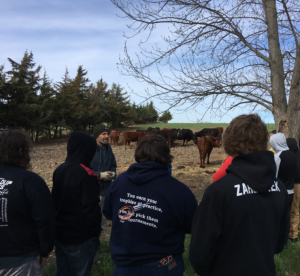
Students learn the about the farm ecosystem and the benefits of livestock on the land. 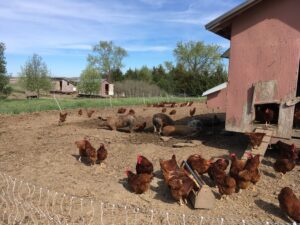
Students learn how pigs and chickens can reduce weed & pest pressure. - In addition to farm tours, we were able to provide presentations to 8 different classrooms. Presentations were given in 6 high school classrooms and 2 college classrooms to students with varying focus areas such as culinary, agriculture, philosophy and marketing. It was exciting to show students how agriculture relates to a myriad of interest areas.
- In 2018, 19 students from Crete High School in the advanced ProStart Culinary Program learned about sustainable agriculture and value-added agriculture through a classroom presentation and local farm tours at Grow with the Flow Aquaponic Horticulture and Robinette Farms. Students witnessed first hand season-extension practices like high tunnels and greenhouses as well as value-added enterprises like cut flowers to micro-greens. Touring the aquaponic farm was a favorite as students were amazed that you can grow plants with fish waste. Students submitted papers or visual projects to share what they learned that day. Several projects are displayed on the Buy Fresh Buy Local Nebraska new sustainable agriculture website (http://buylocalnebraska.org/student-testimonials).
- News spread from the rural high school culinary program about the grant and we were invited to present at an urban high school in Lincoln, Nebraska. In May 2019, we presented to 3 culinary classrooms at an urban high school in Lincoln, Nebraska. 49 students learned about sustainable agriculture, seasonality of foods, and local food production. Several students from this high school and their teacher participated in a "Taste the Season" activity to learn about direct marketing. The activity included a local farmers market tour where students met their farmers and also purchased local ingredients to take back to the classroom and prepare into delicious meals!
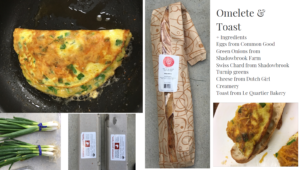
Students prepared meals like Omelet & Toast made with locally sourced onions, eggs, cheese, and greens.
A website was created on Buy Fresh Buy Local Nebraska's website with information on sustainable agriculture and resources for educators. The website URL is: http://buylocalnebraska.org/sustainable-ag
Learning Outcomes
Project Outcomes
I don't think there is an increase in organizational support to teach sustainable agriculture. However, this grant made an impact on the teachers that listened to presentations or accompanied students on farm tours. One high school educator that joined on a farm tour and teaches agriculture was amazed at what he learned and expressed interest in touring more sustainable farms with his students in the future.
One smaller piece of the grant was to tour a local farmers market with students. Although it was challenging to get students to want to participate on an early Sunday morning, the students that did participate were able to choose local ingredients to take back to their culinary classroom. The hands-on experience of preparing a meal with local foods left a more lasting impact than listening to a presentation. For future projects, I'd recommend more hands-on activities such as pairing farm tours with cooking meals using local ingredients.
